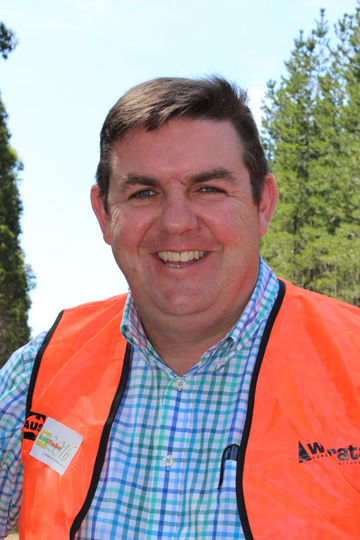
Tim Johnston
The Victorian Association of Forest Industries (VAFI), has thrown its support behind its members’ drive to extend their contracts with VicForests, the state government’s commercial forestry arm. From Philip Hopkins for Timberbiz
Tim Johnston, the chief executive of VAFI said processors needed the certainty of longer contracts to plan their investments and workforce needs.
Six Victorian saw mills have urged the Government to take action to alleviate the uncertainty of not knowing what will happen to their supply contracts past 2021.
The six are Fenning Timbers (Bairnsdale), Ryan & McNulty (Benalla), Dindi Sawmill (Murrindindi), AG Brown Sawmill (Noojee), Kelly’s Timber (Westburn) and Powelltown Sawmills. Fenning, Ryan & McNulty, and Powelltown are VAFI members. The six sawmills directly support 200 employees and 700 jobs downstream.
They fear they are at a competitive disadvantage since the State Government bought into Australian Sustainable Hardwoods mill at Heyfield in Central Gippsland, while their timber supplies are uncertain.
Mr Johnston said a three-year contract might not sound a long time.
“But we are talking about multi-million dollar machinery investments for business owners that are planned years in advance,” he said.
“Resource security is an issue across our membership and the industry more broadly, particularly for our members who process high-quality native timber for downstream manufacture into furniture and appearance-grade building materials.”
Mr Johnston said these were sustainable regional businesses that employ hundreds of local residents either directly in processing, or indirectly through the supply chain, in haulage, logistics and skilled manufacturing.
“In recent years, the available harvest area has been further reduced by wildlife exclusion zones,” he said.
“For example, the availability of ash sawlog is expected to be reduced by 88,000 cubic metres due to Leadbeater’s Possum exclusion zones.”
The Heyfield sawmill and processing plant is owned 51% by management and 49% by the State Government. It is believed the management shareholders will buy the Government’s share over time.
Heyfield was the only mill immediately affected by the resource cut, its supply falling from 150,000 m3 to 80,000m3.
VicForests’ chief executive, Nathan Trushell, said the supply to other customers had not been affected by the decision.
“VicForests is honouring its contractual commitments to the best of our ability,” he said, with contract extensions potentially available to some customers within their current contracts.
Mr Trushell said normally these extensions would have been offered, but the dramatic change in forward supply did not allow this.
“We need to manage any decisions around future timber allocation in a fair and reasonable manner to all our customers, including Heyfield,” he said.
The supply of ash sawlog, now 152,000 m3, must be cut to about 130,000 m3 by 2020. VicForests’ current medium term resource outlook is for 132,000m3 a year of D+ ash sawlogs and 100,000m3 per year of mixed species D+ sawlog.
A Victorian Environment Assessment Council report said bushfires and more discoveries of Leadbeater’s Possum were likely to cut native forest wood supply to Gippsland timber mills by another 25% – 35%over the next 20 years.
However, a state government review of the Leadbeater’s Possum surveys argued that changing to forest landscape planning was the best way to manage endangered species. It would also provide greater certainty and reduced costs to industry.
The VEAC report also found that modelling of climate change impacts predicted that by the end of the century, standing volume and stand density may reduce by 15%.
Currently, about 450,000 hectares, or 5.7% of Victoria’s native forest, is available for harvest. In 2016-17, VicForests harvested 2965 hectares or 0.038% of the total native forest area.






